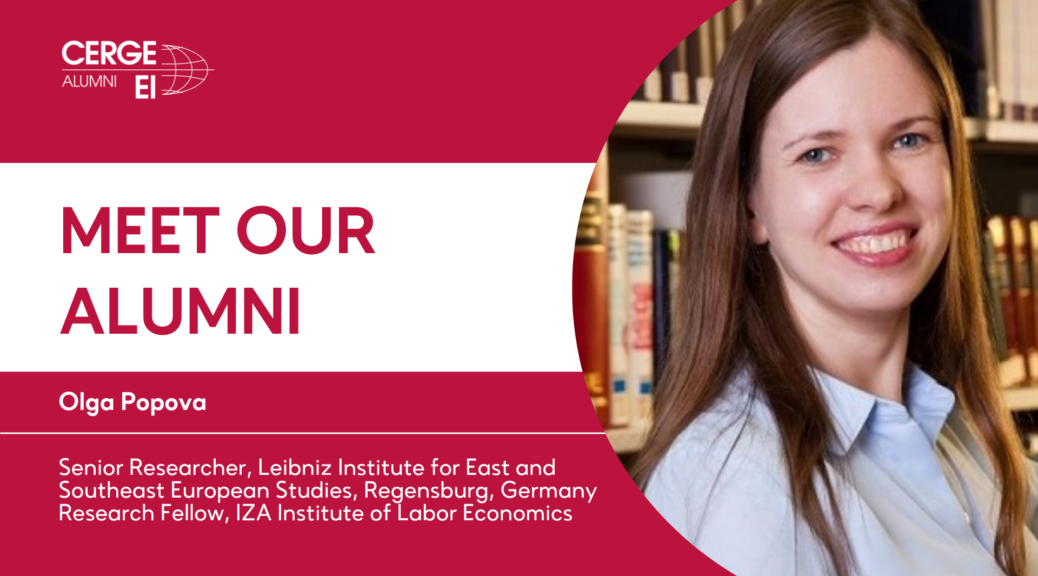Olga Popova, a CERGE-EI PhD in Economics alumna and a senior researcher at IOS (Leibniz Institute for East and Southeast European Studies)’s Economics Department, Regensburg, Germany, and a research fellow at IZA-Institute of Labor Economics shares her research interests, which encompass a wide range of topics, including environmental performance, health, inequality, and labor market decisions. With her impressive achievements, ranked in the top 9% of female economists globally according to RePEc (based on publications in the last ten years), Olga tells us about her research experience and implications of her recent paper. The interview was done by our PhD student Mari Mtchedlishvili.
Can you tell us about your research focus and what led you to become interested in health and environmental, and development economics?
I conduct empirical policy-oriented research, mainly in applied microeconomics. My Ph.D. dissertation focuses on the role of economic reforms and institutions in shaping individual subjective well-being. Over my research career, this interest has broadened substantially. I now examine causes and consequences of various objective socioeconomic outcomes, e.g., environmental performance, health, inequality, or individual labor market decisions. The motivation to work on these topics is driven by the desire to understand why some countries perform economically, socially, and environmentally better than others, what are the root causes of such differences at micro- and subnational levels, and what can individuals, firms, and policy-makers do to reduce these differences in development.
Your recent publications cover a range of topics, from energy efficiency and quality certification to the role of democracy in protecting the environment and the persistent effects of Communist regime affiliations on well-being and preferences. What motivates you to pursue such diverse research interests and how do you balance them all?
In my opinion, modern empirical economics has become much more interdisciplinary than before. For example, one may explain economic phenomena by theories stemming from natural sciences. Focusing on different topics also gives comparative advantages in publishing research results. In my research, I am interested in topics that inform evidence-based policies and provide added social value. In general, my research strategy has three principles: 1) economic research must be policy-relevant, 2) collecting unique primary data and/or combining several datasets in a novel way as a prerequisite for gaining truly new insight, and 3) applying state-of-the-art methods to identify relationships of interest and provide a causal interpretation of findings.
One of your recent publications is on energy efficiency, market competition, and quality certification in Central Asia. Could you explain briefly what you found in your research and what implications it has for environmental policy in transitional countries?
This paper focuses on the pro-environmental behavior of firms in Central Asia and has recently been published in Energy Policy (https://doi.org/10.1016/j.enpol.2023.113539). It is a joint work with Vladimir Otrachshenko, a CERGE-EI alumnus who currently works at the Justus-Liebig-University Giessen, and with Christopher Hartwell from Zurich University of Applied Sciences. Two main findings reveal that product quality certification and informal market competition help to make firms energy efficient. Given that, as in many post-Soviet countries, formal market institutions in Central Asia remain not well-developed, regulatory instruments may not necessarily help move the region forward to a low-carbon sustainable development. Our findings suggest that in a low institutional quality environment, informal market competition may force firms to signal the quality of their product and to improve performance by adopting certifications. As a result, firms become more efficient in their energy use.
You work with multiple research institutes across Europe. How does this collaboration contribute to your research?
Research collaborations and teamwork, important for knowledge exchange, give more opportunities to discuss ideas with co-authors and with colleagues in their departments and to look at research questions from different angles. This also helps to shape my own research productivity. As a result, according to IDEAS/RePEc, I am currently ranked in the top 9% female economists globally, based on publications in the last 10 years.
What advice would you give to students interested in pursuing a career in health and environmental economics, as well as development economics, and what skills do you think are essential for success in these fields? How has CERGE-EI helped you succeed?
The most important thing consists of your own motivation, curiosity, and interest in the topics you are studying. At CERGE-EI, I learned that there are always multiple opportunities to pursue, and you should not limit yourself to just one topic or one field. A Ph.D. dissertation marks the start of your research journey. If you decide to pursue an academic career once you graduate, be efficient in publishing your ideas and open yourself up to new collaborations. This will help you remain competitive and at the forefront of economic knowledge. This can only be possible if you are truly interested in the questions you are investigating.
